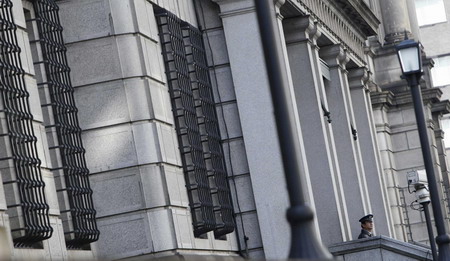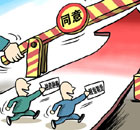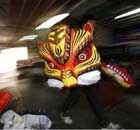Global Biz
Japan to hold key interest rate at 0.1%
(Xinhua)
Updated: 2010-02-18 14:48
 |
Large Medium Small |
TOKYO: The Bank of Japan (BOJ) decided on Thursday to maintain its key benchmark interest rate at 0.1 percent in a unanimous vote, as the bank faces increased pressure from the government to do more to tackle deflation.
|
 A security personnel stands guard at the Bank of Japan building in Tokyo February 18, 2010. The Bank of Japan offered no response to renewed government pressure to fight deflation more aggressively, keeping interest rates on hold and sticking to its assessment of the economy on Thursday. [Agencies] |
The bank's policy board kept the loan facility for commercial banks and monthly purchases of government bonds unchanged, pledging to maintain an "extremely" easy monetary policy, the BOJ said in a statement in Tokyo.
"To this end, the bank will continue to consistently make contributions as a central bank and aim to maintain the extremely accommodative financial environment," the BOJ said.
However, increasing political pressure on the bank is already surfacing. Finance Minister Naoto Kan said this week in parliament that Japan should adopt a "policy target" of achieving 1 percent inflation and the government wants to work with the bank to spur prices.
BOJ board members have stopped short of adopting inflation targeting, saying in December that their "understanding" of price stability is increases of up to 2 percent, with a median of 1 percent.
Notably, consumer prices fell for a 10th month in December.
BOJ Governor Masaaki Shirakawa has previously told the House of Representatives budget committee that deflation can't be beaten by the central bank alone, while adding that it will act "decisively" should financial markets become volatile.
The BOJ has forecast that deflation will last until fiscal 2011, although it expects price falls to narrow amid a recovery in Japan's economy, according to the central bank's statement.
Additionally the BOJ said that the current state of the nation's economy is improving as exports and production continued to increase on the back of the strengthening of emerging economies like China.
Consumer spending is also "picking up" on the back of government stimulus measures, but public investment is "leveling off," the BOJ said.
According to the central bank, the pace of the economic improvement is likely to remain "moderate" until the middle of fiscal 2010 that starts in April and then the growth pace will accelerate, gradually supported by an increase in exports, the BOJ said.
Governor Masaaki Shirakawa may indicate how willing the central bank is to further ease policy at a news conference in Tokyo later today.











